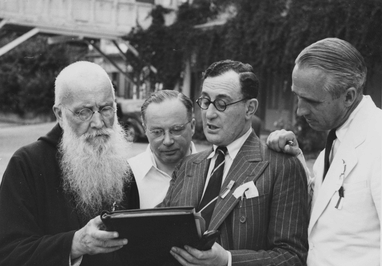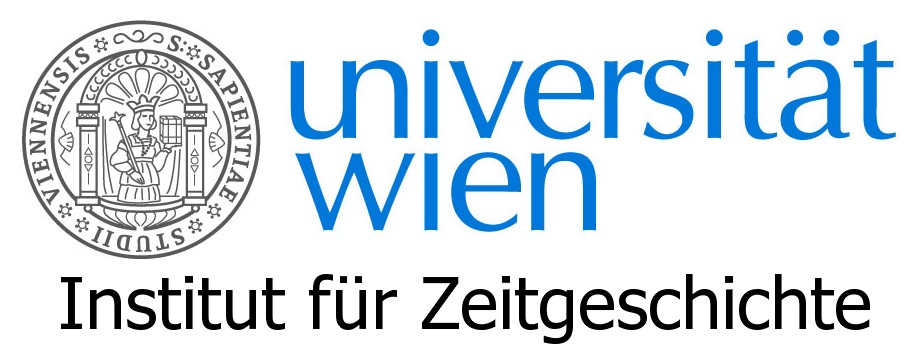VWI goes to ... / VWI invites ...
Der Kolloquienzyklus der VWI-Fellows
Die VWI-Fellows präsentieren Zwischenresultate ihrer Forschungsvorhaben im Rahmen von Kolloquien, die – im kleinen Rahmen angekündigt – auch einer akademisch und inhaltlich interessierten Öffentlichkeit zugänglich sind. Die Vorträge werden durch eine im jeweiligen Thema ausgewiesene Fachperson in Form einer Respondenz oder eines Kommentars begleitet und von den anderen Fellows und dem Publikum diskutiert.
Das Veranstaltungsformat VWI goes to … war ursprünglich aus akutem Raummangel geboren worden, konnte doch das Institut an seinem früheren Standort, am Desider-Friedmann-Platz nicht einmal eine kleine Veranstaltung organisieren. Allein aus dem Kontakt zu anderen akademischen Einrichtungen in Wien, zum Teil auch in der weiteren Region, ergab sich in der Folge – auch dank der jeweils eingeladenen Kommentatorinnen und Kommentatoren – wiederum die einzigartige Möglichkeit, die Fellows und die Forschungen des VWI mit anderen Institutionen, methodischen Ansätzen, Forschungsfragen und Ideen zu vernetzen, das Institut in den regionalen Forschungsraum noch mehr zu integrieren. Aus diesem Grund wurde entschieden, das Format auch am neuen Standort beizubehalten. Gleichzeitig eröffnete sich aber am Rabensteig auch die Gelegenheit, zu diesen Kolloquien Institutionen auch an das VWI einzuladen. Aus diesem Grund trägt ab Herbst 2016 das VWI-Kolloquium entsprechend alternierend auch die Bezeichnung VWI invites... .
| VWI invites/goes to... | |||
| Daniel Cohen: Between Charity and Solidarity. ‘Philosemitism’ in Post-Holocaust Europe 1945–1950 | |||
Mittwoch, 10. Oktober 2018, 15:00 - 17:00 Wiener Wiesenthal Institut für Holocaust-Studien (VWI) Rabensteig 3, 1010 Wien
|
|||
VWI invites the Institute of Contemporary History, University of Vienna Although antisemitism did not vanish with the end of Nazism, various forms of philosemitic discourse appeared in Western Europe in the wake of the Holocaust. Philosemitism, to be sure, did not necessarily involve ‘love for Jews’. In West Germany, positive pronouncements on Jews by politicians or government officials contrasted with the silence on Jewish victims among a public still “unable to mourn”. As the historian Frank Stern has demonstrated, manifestations of philosemitism in the early Federal Republic secured Germany’s acceptance in the West while erasing the Nazi past. Yet in Western Europe, philosemitism emerged as the dominant form of public discourse about Jews. Self-imposed or externally enforced, a moratorium on the public airing of anti-Jewish sentiment reduced the possibility of openly antisemitic attitudes. There were of course numerous ways to transgress this prohibition. As Theodor Adorno has argued, a “secondary antisemitism” conceived as a defence mechanism against guilt and accountability replaced the tabooed biological racism of the Nazi era.
Commented by Frank Stern G. Daniel Cohen is a Senior Fellow at the VWI and Associate Professor of History and Jewish Studies at Rice University, Houston. He has published widely on Jewish refugees, human rights, and humanitarianism in the twentieth century. He is currently completing a history of ‘philosemitism’ in Europe from 1945 to the present. Frank Stern is Professor of Cultural History at the Institute for Contemporary History at Vienna University. His main focus lies on visual culture, film and the media. He is curator of film retrospectives in Austria, Germany, Israel and co-director of the Jewish Film Club Vienna. His numerous academic publications include The Whitewashing of the Yellow Badge. Antisemitism and Philosemitism in Postwar Germany, Oxford 1992. Click here to download the invitation as a PDF file. Please register at Diese E-Mail-Adresse ist vor Spambots geschützt! Zur Anzeige muss JavaScript eingeschaltet sein! by latest Tuesday, 9 October, 12.00 am and bring your ID. In cooperation with:
|
|||






 Yet despite resistance, philosemitism became a central feature of post-war Western Europe. It appeared in different forms: reverse antisemitism; the legitimation of non-Jewish political, theological, or philosophical projects using the Jewish trope; or identification with Jews as symbols of injustice and human rights violations. A critical history of European philosemitism is thus in order. What were its meanings and how did it change over time? My presentation goes back to the immediate post-war period. One early form of philosemitism was ‘anti-antisemitism’: a critique of anti-Jewish prejudice without necessarily involving empathy for Jews. My presentation compares patterns of Christian and secular anti-antisemitism in France, Italy, the Netherlands, the United Kingdom, and occupied Germany between 1945 and 1950. It exposes the ambiguities of philosemitic sentiments torn between charity and political solidarity. Coded and itself not immune of bias, ‘anti-antisemitism’ became the main channel of philosemitic discourse until the later rise of Holocaust consciousness in Western Europe.
Yet despite resistance, philosemitism became a central feature of post-war Western Europe. It appeared in different forms: reverse antisemitism; the legitimation of non-Jewish political, theological, or philosophical projects using the Jewish trope; or identification with Jews as symbols of injustice and human rights violations. A critical history of European philosemitism is thus in order. What were its meanings and how did it change over time? My presentation goes back to the immediate post-war period. One early form of philosemitism was ‘anti-antisemitism’: a critique of anti-Jewish prejudice without necessarily involving empathy for Jews. My presentation compares patterns of Christian and secular anti-antisemitism in France, Italy, the Netherlands, the United Kingdom, and occupied Germany between 1945 and 1950. It exposes the ambiguities of philosemitic sentiments torn between charity and political solidarity. Coded and itself not immune of bias, ‘anti-antisemitism’ became the main channel of philosemitic discourse until the later rise of Holocaust consciousness in Western Europe.